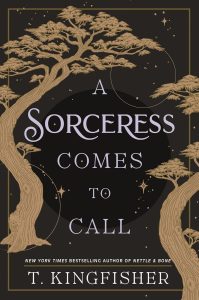A Sorceress Comes to Call by T. Kingfisher: Review by Liz Bourke
 A Sorceress Comes to Call, T. Kingfisher (Tor 978-1-250-24407-9, $27.99, 336pp, hc ) August 2024. Cover by Christina Mrozik.
A Sorceress Comes to Call, T. Kingfisher (Tor 978-1-250-24407-9, $27.99, 336pp, hc ) August 2024. Cover by Christina Mrozik.
A Sorceress Comes to Call is the latest novel from the pen of award-winning fantasy and horror writer T. Kingfisher, also known as Ursula Vernon. The humour and compassion of Kingfisher’s early work has borne comparison to Terry Pratchett, and in recent years she’s gone from strength to strength, with a growing breadth of theme and tone. As you may have guessed, I’m a fan.
A Sorceress Comes to Call is a standalone novel, not linked to any of Kingfisher’s other long-form works. It’s something of a departure from the concerns of her more recent fantasy novels, blending a Regency-esque setting with the tone and sensibilities of the Gothic novel, flirting right up to the line of horror before pulling back to offer eucatastrophe in its ending.
Thirteen-year-old Cordelia knows that her mother, Evangeline, is not like other people’s parents. Most mothers don’t take down the doors of their daughters’ rooms, or prevent their daughters from making friends and attachments, and most mothers can’t control their daughters’ every move and every word, at times for days on end, in order to move them about as suits the mother’s will. Cordelia’s mother is a sorceress, selfish and vengeful and inclined to do very bad things if it suits her whim. After a minor setback with her current ‘‘benefactor,’’ upon whom Evangeline wreaks dreadful vengeance, Evangeline decides that it will suit her better to marry a wealthy man in the city. Consequently, she packs herself and Cordelia off to accomplish this. Evangeline can’t simply bewitch a man into marrying her, for the wedding ritual breaks spells, but her magic can certainly help trick a man into marriage.
Hester is comfortably enjoying her ageing spinsterhood. Her brother the Squire (Samuel by name) is not greatly blessed with intelligence, but he’s not a bad man, and she’s been content living in his house. Pragmatic, kind, and capable, she doesn’t ignore the premonition of doom that strikes her three days before Evangeline crosses her brother’s threshold, but she’s not exactly sure what to do about it once Evangeline and Cordelia arrive. She can tell that Evangeline is bad news, but she can’t exactly forbid her brother to marry at all. And although she doesn’t know it, Hester is at an additional disadvantage: she has no idea that such things as sorceresses still exist. But she can, at least, invite a small group of friends over for a house party, in the hopes that they’ll have solutions that she does not. And she can try to befriend the mouse of a child that’s come wide-eyed and stumbling in Evangeline’s wake: Cordelia.
In the Squire’s house, surrounded by adults who aren’t unreasonably abusive horrorshows – who are even kind – and who, once they notice that Evangeline is likely an abusive parent, start trying to shield Cordelia from her, Cordelia begins to see her mother as someone who can be opposed. And as someone who should be opposed before she can work more harm. But even as she starts to make common cause with Hester, Cordelia remains at a loss for how to stop her mother, short of killing her – and Evangeline herself isn’t willing to stop short of murder, as is proved when death strikes the house party. Everything is going Evangeline’s way: She’s got the Squire all the way to the church and into marriage. It seems she’s won.
There’s a slim chance that Hester, Cordelia, and their allies might be able to sever Evangeline’s connection with Falada, her terrible and beautiful horse-shaped familiar, and deprive her of power that way. But if it goes wrong, Evangeline’s vengeance will surely be horrifying.
Like many of Kingfisher’s novels, A Sorceress Comes to Call is built on a bedrock of kindness, stubbornness, and pragmatism. The viscerally horrifying and the bone-chillingly awful are juxtaposed against people, like Hester (and Hester’s friend Richard, who was once her lover and still wants to be) who pay attention to cruelties and chose to oppose them. Cordelia must overcome her (entirely justified) fear of her mother in order to try to protect other people from her mother’s viciousness, and even though it is both terrifying and seemingly futile, she keeps trying. Hester, too, has fears to overcome, though her fears are different from Cordelia’s. One of them is a complicated fear centred around the man she loves, who loves her right back, concerning independence, ageing, and desire.
It’s a delight to see a woman like Hester as a main character, ageing comfortably, with a bad leg and some regrets but fundamentally secure in who she is as a person, dealing with the complicated concerns of adult relationships, set against Cordelia, still figuring out who she can be as a person, whose primary dilemma is very simple – her mother is abusive and grasping, as well as a sorceress – even though it’s not easy to solve. They counterbalance each other neatly, each capable of learning from the other.
A Sorceress Comes to Call boasts a tightly claustrophobic atmosphere of gathering doom. It marries a compelling cast of characters to a wicked sense of humour, a deft grasp of pace and absolutely nailbiting tension. Kingfisher has outdone herself again: this is the perfect blend of Gothic horror and fantasy of manners that I didn’t know I needed.
Also, it has attack geese. How can you turn that down?
Interested in this title? Your purchase through the links below brings us a small amount of affiliate income and helps us keep doing all the reviews you love to read!
Liz Bourke is a cranky queer person who reads books. She holds a Ph.D in Classics from Trinity College, Dublin. Her first book, Sleeping With Monsters, a collection of reviews and criticism, is out now from Aqueduct Press. Find her at her blog, her Patreon, or Twitter. She supports the work of the Irish Refugee Council and the Abortion Rights Campaign.
This review and more like it in the August 2024 issue of Locus.
 While you are here, please take a moment to support Locus with a one-time or recurring donation. We rely on reader donations to keep the magazine and site going, and would like to keep the site paywall free, but WE NEED YOUR FINANCIAL SUPPORT to continue quality coverage of the science fiction and fantasy field.
While you are here, please take a moment to support Locus with a one-time or recurring donation. We rely on reader donations to keep the magazine and site going, and would like to keep the site paywall free, but WE NEED YOUR FINANCIAL SUPPORT to continue quality coverage of the science fiction and fantasy field.
©Locus Magazine. Copyrighted material may not be republished without permission of LSFF.









